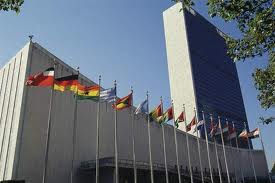Civil society warns UN Security Council climate change a driver of conflict, hunger and poverty
15 February 2013

[New York – United States] – February 15, 2013 – Climate Action Network-International (CAN-International) today warned a special event for United Nations Security Council members at the UN headquarters in New York that climate change was a critical driver of poverty, inequality, instability, and conflict which would ultimately affect us all.
Wael Hmaidan, director of CAN-International, told the meeting, convened by Pakistan and the United Kingdom, that the situation demanded an unprecedented commitment to collective action to drastically reduce these climate-driven risks which were already being experienced, first and foremost, by the poorest and most vulnerable within our societies.
“We are gravely concerned by the prospects for mass displacement of people within States and across borders driven directly by climate impacts like sea level rise, droughts, desertification, biodiversity loss and indirectly by its impacts on food and natural resources,” Hmaidan said.
“We recognise that the decision to leave one's home and community is often the result of multiple factors, but that climate change impacts are often a critical driver, he said.
For example, the thousands of people who were displaced from Somalia into neighbouring countries in 2011 were not primarily fleeing conflict, but in search of food in the wake of drought.
Tim Gore, from Oxfam International, also present at the event, said that nowhere can this climate risk be more clearly seen than in the global food system.
“Droughts or floods can wipe out entire harvests, as we have seen in recent years in Pakistan, in the Horn of Africa and across the Sahel. And when extreme weather hits major world food producers – like last year’s droughts in the US and Russia – world food prices rocket. This presents a major risk to net food importing countries, such as Yemen, which ships in 90% of its wheat,” Gore said.
“The food riots and social unrest seen in the wake of the 2008 food price spikes were not a one-off phenomenon, but a sign of the risks we face through our failure to feed a warming world. With major producers either suffering or barely recovering from extreme heat and drought, combined with world cereal stocks falling again, world food security remains on a knife-edge.
Hmaidan said governments need to dramatically scale up public investments to help communities and countries adapt to the changing climate as well while at the same time ramp ing up international efforts to cut greenhouse gas emissions to prevent much greater harm.
“Adequate preparation for permanent loss and damage inflicted by climate change, including the establishment of a new international mechanism under discussion at the UNFCCC and the recognition of new rights for climate-forced migrants is required,” Hmaidan said.
Contacts
Climate Action Network (CAN) is a global network of over 700 NGOs working to promote government and individual action to limit human-induced climate change to ecologically sustainable levels.
For more information, please contact Climate Action Network-International communications coordinator Ria Voorhaar on +49 157 3173 5568 or rvoorhaar@climatenetwork.org


